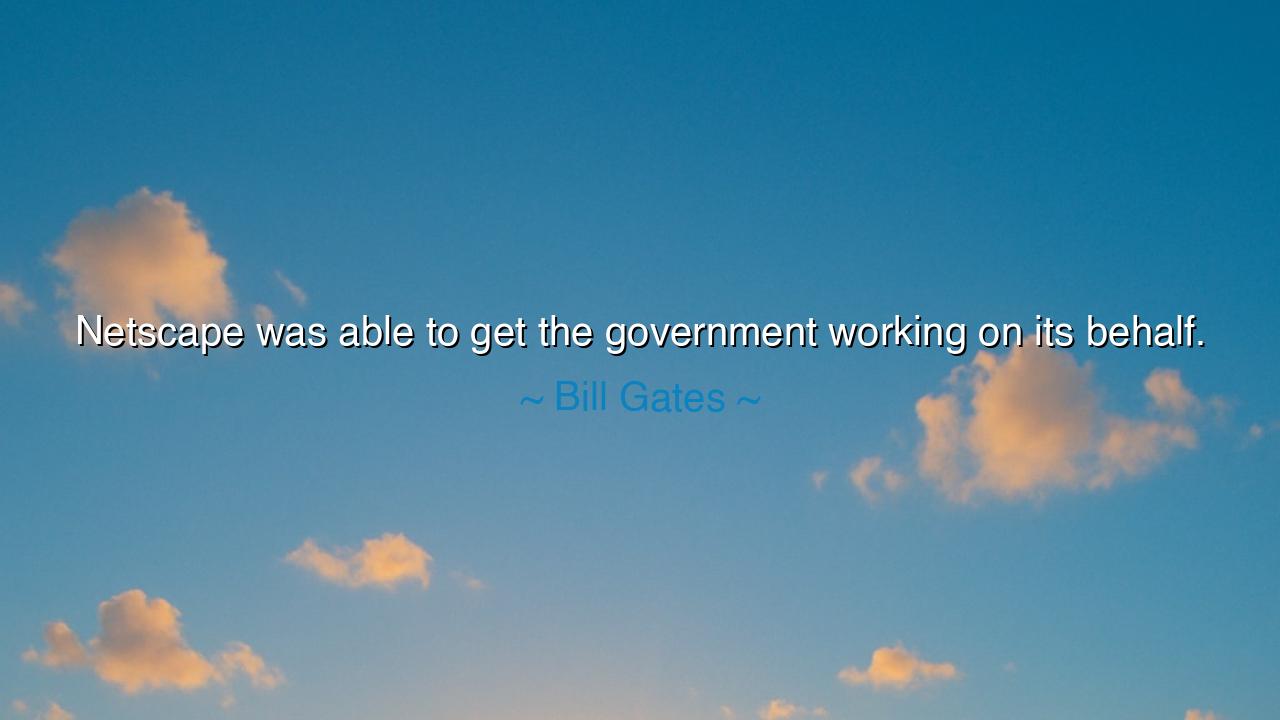
Netscape was able to get the government working on its behalf.






The words of Bill Gates, spoken during one of the most defining moments in the history of technology, ring with quiet bitterness and profound insight: “Netscape was able to get the government working on its behalf.” Behind this simple sentence lies a great struggle—not of swords or empires, but of innovation, rivalry, and the collision between enterprise and power. In this quote, Gates reflects on a moment when competition in the marketplace crossed paths with the weight of government intervention. His tone is not only defensive—it carries the ancient truth that once politics enters the realm of creation, the field of merit is no longer even.
To understand his meaning, one must return to the 1990s, the dawn of the Internet Age. In that era, Microsoft stood as the unchallenged titan of software. Gates had built his empire through brilliance and relentlessness, his Windows operating system becoming the foundation of the digital world. Then came Netscape, a rising star that sought to claim the future through its web browser, the Netscape Navigator. The Internet was young, and whoever controlled the gateway to it would command the future. The battle that followed was not fought with bullets, but with code, strategy, and influence. Gates’ words were born from that conflict—when Netscape, unable to match Microsoft’s dominance through innovation alone, turned to the one power greater than any corporation: the government itself.
In 1998, the United States government launched its monumental antitrust case against Microsoft, accusing the company of monopolistic practices for bundling Internet Explorer with Windows. Netscape’s complaints played a major role in bringing that case to life. For Gates, this was not just an attack on Microsoft—it was a shift in the balance of the business world. To him, it symbolized a dangerous truth: that in the modern age, victory in commerce does not depend solely on creativity or competition, but on alliances with authority. His quote captures this realization with cold precision. When he said Netscape “got the government working on its behalf,” he was speaking to the timeless reality that politics and business, once intertwined, can shape destinies more powerfully than merit alone.
Yet this is no new story. History is filled with echoes of the same struggle. In the Renaissance, inventors, traders, and thinkers depended not only on their genius, but on royal favor. Galileo himself, whose telescope reshaped humanity’s view of the cosmos, suffered persecution not because his science was false, but because it threatened the power of those who ruled minds and hearts. Centuries later, industries and innovators still find that progress cannot stand apart from the reach of law and politics. The spirit of invention is divine—but the hand of authority is worldly, and it demands its due. Gates’ lament thus becomes a modern echo of an ancient lesson: that the fate of visionaries is never determined by genius alone, but by how power chooses to embrace or oppose them.
Yet there is deeper wisdom in Gates’ reflection—one not of complaint, but of awakening. For he learned, as all great builders must, that power attracts scrutiny, and the higher one rises, the more tightly the world’s eyes fix upon him. The government’s involvement was not simply a curse; it was a test of endurance and humility. Through the fire of antitrust trials, Microsoft transformed. It learned to adapt, to evolve, to survive in a world where influence must coexist with accountability. The once-defiant Gates became a philanthropist and reformer, turning his ambition toward healing rather than conquering. Thus, what began as a lesson in rivalry became a lesson in responsibility.
The meaning of the quote, therefore, extends far beyond the rivalry of two companies. It is a warning to all who rise through talent or enterprise: that great success invites great opposition, and that the alliance between ambition and politics is a double-edged sword. The powerful must walk carefully, for their victories may summon the very forces that undo them. But it is also a reminder that influence, when wielded wisely, can turn conflict into cooperation, and rivalry into reform. The true test of leadership lies not in avoiding opposition, but in facing it with clarity and purpose.
So, let this teaching be carried forward to future generations: power must never become arrogance, and genius must never blind itself to justice. Whether in art, in commerce, or in governance, the balance between creation and control is fragile. The wise will learn from Gates’ experience—not to fear the government, but to understand its nature; not to despise competition, but to engage it honorably. For every age will have its Netscapes and its Microsofts, its innovators and its regulators. What matters most is not who triumphs, but who learns to wield power with humility, vision, and grace.
Thus, from the rivalry of men and the judgment of nations, one truth emerges eternal: those who build the future must learn to live with the guardians of the present, and those who seek greatness must remember that every empire—whether of code or stone—stands only as long as it serves the good of mankind.






AAdministratorAdministrator
Welcome, honored guests. Please leave a comment, we will respond soon